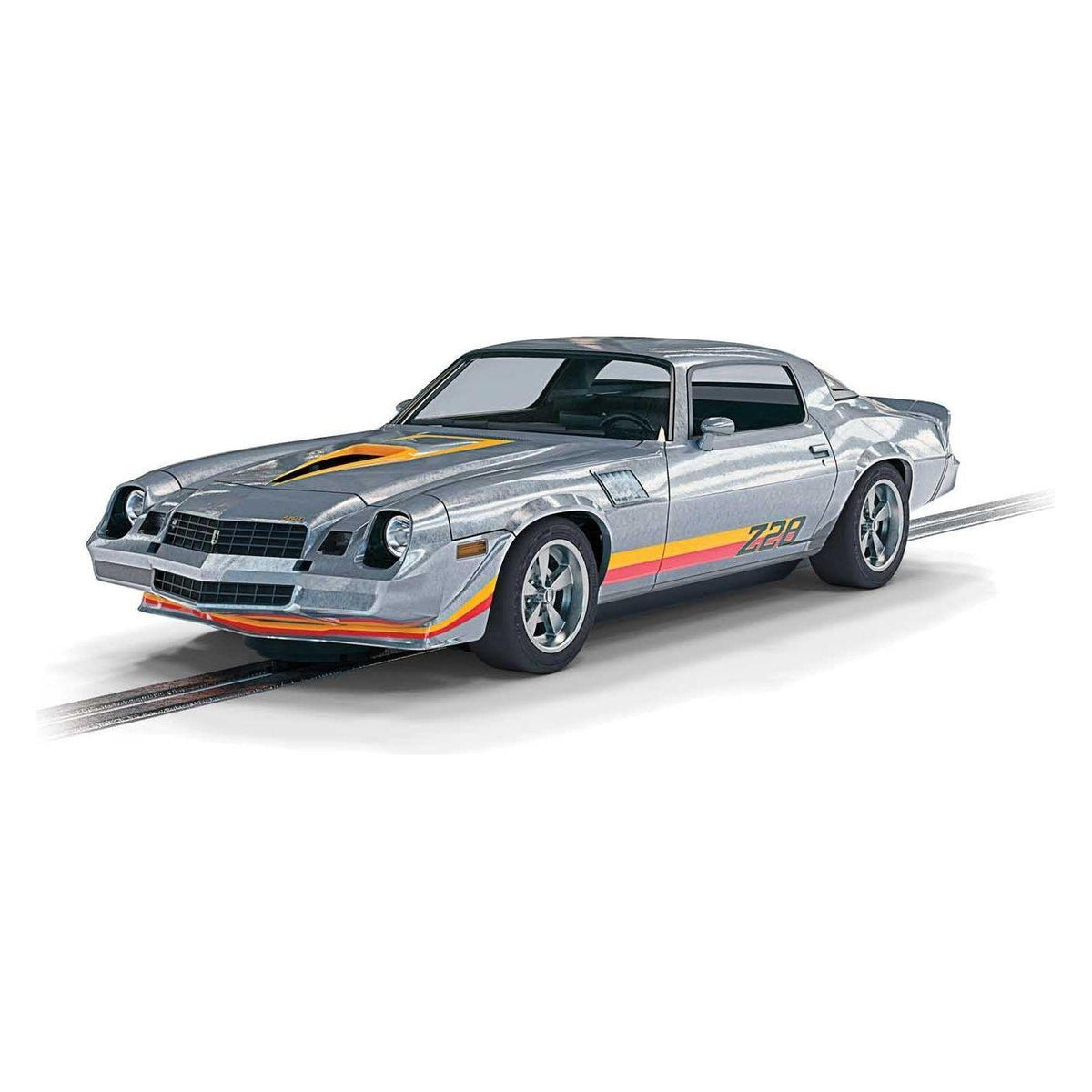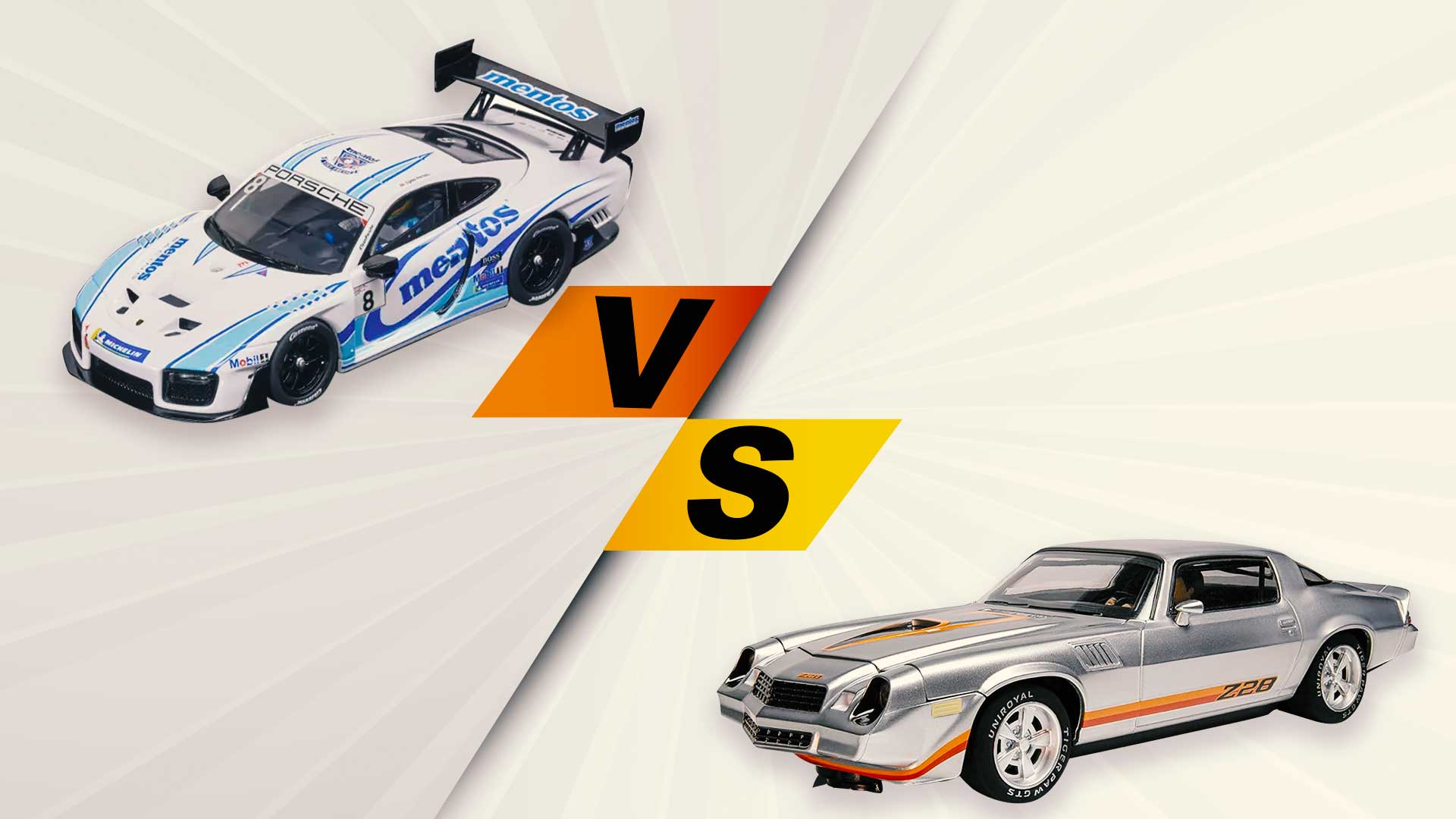Digital vs. Analog Slot Car Systems: Pros and Cons
Discover the perfect racing system for your hobby journey
The world of slot car racing has witnessed a remarkable evolution since its inception, transforming from simple analogue systems into sophisticated digital racing experiences. Today's enthusiasts face an exciting choice between traditional analogue slot cars and modern digital systems, each offering unique advantages for different racing styles and preferences. Whether you're a seasoned collector or just beginning your slot car journey, understanding these two distinct technologies will help you make an informed decision for your racing adventures.
| Slot Car Systems at a Glance | ||
|---|---|---|
| Feature | Analogue Systems | Digital Systems |
| Track Capacity | One car per lane | Multiple cars per lane with lane-changing |
| Setup & Operation | Simple, plug-and-play functionality | More complex with electronic programming |
| Racing Features | Basic speed control and racing | Advanced features including pit stops and fuel management |
| Investment Level | More affordable initial setup | Higher investment for advanced features |
| Brand Compatibility | Universal with most slot car brands | System-specific (e.g., Scalextric, Carrera) |
| Ideal Users | Beginners and casual racers | Experienced enthusiasts and competitive racers |
The Evolution of Slot Car Racing: A Brief History
The fascinating journey of slot car racing spans over a century, evolving from simple mechanical toys to sophisticated racing systems. In the early 1900s, what began as a novel concept has transformed into a beloved hobby that continues to captivate enthusiasts worldwide. The modern era of slot car racing truly gained momentum in the 1950s and 1960s, establishing itself as more than just a passing trend.
This revolutionary period saw the emergence of pioneering brands like Scalextric, who introduced their first electric-powered slot cars in 1957. These early models, through their innovative design and accessibility, helped establish the foundations for what would become a thriving hobby. The introduction of better materials, improved motor designs, and more realistic car models steadily enhanced the racing experience, drawing both casual enthusiasts and serious competitors to the sport.

Modern slot car technology brings unprecedented detail and performance
Understanding Analogue Slot Car Systems
At the heart of traditional slot car racing lies the analogue system, beloved for its straightforward approach and reliable performance. These systems operate on a fundamental principle: each slot car receives power through metal strips embedded in the track, with speed controlled by a simple hand-held throttle. This direct connection between controller and car creates an intuitive racing experience that has stood the test of time.
The simplicity of analogue systems extends beyond basic operation. Maintenance becomes straightforward, with easily accessible parts and clear troubleshooting paths. This accessibility has fostered a strong community of enthusiasts who enjoy modifying and customising their track setups, creating increasingly complex and engaging racing experiences.
Perhaps most notably, analogue systems offer unparalleled compatibility across different manufacturers. This interchangeability allows racers to mix and match components from various brands like Carrera and Scalextric, creating truly personalised racing experiences. The result is a vibrant ecosystem where creativity and competition flourish side by side.
Advantages of Digital Slot Car Systems

The advent of digital technology has revolutionised slot car racing, introducing capabilities that were once merely dreams. Modern digital systems have transformed the racing experience through sophisticated features like lane changing, multiple cars per track, and advanced race management systems. These innovations have created entirely new racing strategies and competitive possibilities.
Digital systems excel in creating more realistic racing scenarios through features like virtual fuel management, pit stops, and weather conditions. The integration of digital accessories allows for lap timing, race position tracking, and even championship management. This level of sophistication appeals particularly to serious enthusiasts who seek the most authentic racing experience possible.
Perhaps most impressively, digital systems can accommodate up to eight cars on a two-lane track, thanks to intelligent lane-changing technology. This breakthrough has dramatically enhanced the social aspect of slot car racing, allowing more participants to compete simultaneously. Combined with features like individual brake control and adjustable power settings, digital systems offer unprecedented levels of customisation and control.
Pro Tip:
When transitioning from analogue to digital racing, consider starting with a basic digital set to familiarise yourself with the new features before expanding your setup.
Hybrid Slot Car Systems: The Best of Both Worlds
As the slot car hobby continues to evolve, manufacturers have developed innovative solutions to bridge the gap between traditional and modern racing systems. Hybrid slot car systems represent a significant breakthrough, offering enthusiasts the flexibility to enjoy both analogue and digital racing on the same track. This versatility has opened new possibilities for collectors and racers alike, allowing them to preserve their existing slot car collections while embracing new technology.
These sophisticated systems employ clever engineering to accommodate both racing formats. Through specialised track sections and adaptable power systems, racers can seamlessly switch between analogue and digital modes. This innovation has proven particularly valuable for racing clubs and hobby groups, where members may possess different types of cars and varying levels of experience with digital systems.

Iconic models like the 1966 Batmobile showcase the diverse range of slot cars available
Comparing Racing Experiences
| Racing Experience Comparison | ||
|---|---|---|
| Racing Aspect | Analogue Experience | Digital Experience |
| Race Management | Manual lap counting, basic timing | Automated tracking, real-time statistics |
| Racing Dynamics | Fixed lane racing, consistent experience | Dynamic lane changes, strategic overtaking |
| Maintenance Needs | Simple cleaning and basic upkeep | Regular software updates, chip maintenance |
| Track Design | Traditional layouts, multiple lanes | Complex configurations with special sections |
Which Slot Car System Should You Choose?
Selecting the ideal slot car system depends largely on your racing aspirations and existing collection. Beginners often find that starting with an analogue set provides the perfect introduction to the hobby, offering a straightforward racing experience without overwhelming complexity. The lower initial investment and wider compatibility of analogue systems make them particularly appealing for those just discovering the excitement of slot car racing.
For experienced enthusiasts seeking more dynamic racing experiences, digital systems present compelling advantages. The ability to race multiple cars per lane, combined with features like pit stops and fuel management, creates opportunities for more strategic and engaging competitions. Brands like Scalextric and Carrera offer comprehensive digital systems that can transform your racing experience.
Hybrid systems offer perhaps the most flexible solution, particularly for those with existing collections or uncertain about committing fully to digital racing. These versatile setups allow you to explore digital features while maintaining compatibility with traditional analogue cars, providing a future-proof investment in your hobby.
Expert Advice:
Consider starting with a quality starter set that matches your intended racing style. This allows you to experience the basics while leaving room for future expansion with additional accessories and upgrades.
Fascinating Facts About Slot Car Racing
The world of slot car racing holds numerous captivating details that even longtime enthusiasts might find surprising. From technological innovations to historical developments, these fascinating aspects of the hobby showcase its rich heritage and continuing evolution in the modern era.

Modern slot cars showcase remarkable detail and performance capabilities
Beyond Traditional Racing
While most enthusiasts are familiar with standard car racing, the slot racing hobby has expanded far beyond conventional vehicles. Contemporary manufacturers offer an impressive array of options, including racing motorcycles, boats, and even aircraft. These diverse models demonstrate the remarkable versatility of slot racing technology, though they maintain a specialised niche within the broader hobby community.
Evolution of Control Systems
The development of racing controllers represents one of the most significant technological advances in slot car racing. Modern digital controllers have evolved dramatically from their humble beginnings as simple rheostats. Today's sophisticated controllers offer precise adjustments for acceleration, braking, and even traction control, allowing racers to fine-tune their driving experience based on specific track conditions and car characteristics.
Did You Know? The first commercial slot cars, introduced in 1912, were powered by clockwork mechanisms rather than electricity. The transition to electric power revolutionised the hobby, leading to the sophisticated systems we enjoy today.
Speed Records and Competition
The competitive aspect of slot car racing has pushed the boundaries of what these miniature vehicles can achieve. Professional-grade slot cars fitted with high-performance motors and precision-engineered components can reach scale speeds that would equate to over 600mph in real-world terms. This incredible performance is made possible through advanced track accessories and careful tuning.
Customisation and Modification
The hobby has fostered a vibrant community of modifiers and customisers who push the boundaries of what's possible with slot cars. From hand-painted liveries to custom-machined parts, enthusiasts continue to find new ways to personalise their racing vehicles. This creative aspect of the hobby has been further enhanced by digital technology, allowing for unprecedented levels of modification and performance tuning.
Collector's Corner:
Many vintage slot cars, particularly those from renowned manufacturers like Scalextric and Carrera, have become highly sought-after collectibles, with some rare models commanding impressive values among collectors.
Frequently Asked Questions
Can I mix digital and analog cars on the same track?
While analog cars cannot run on digital tracks without modification, many modern hybrid systems allow for both types of racing. Some manufacturers offer digital chip conversions that can upgrade your analog cars for use on digital tracks. However, digital cars typically cannot run on analog tracks due to their sophisticated electronics.
What maintenance do slot cars require?
Regular maintenance for slot cars includes:
- Cleaning the track contacts and car braids after each racing session
- Lubricating moving parts, especially the motor and gears
- Checking and tightening any loose screws or components
- Inspecting tires for wear and replacing when necessary
- For digital systems, ensuring software and firmware are up to date
What size track do I need to start racing?
For beginners, a basic starter set with 8-12 feet of track length provides enough space for enjoyable racing while fitting in most rooms. As you progress, you can expand your layout with additional track sections. Consider your available space and preferred racing style when planning your layout.
Which brands are compatible with each other?
In analog systems, most major brands like Scalextric and Carrera can be used together with appropriate track adapters. However, digital systems are generally brand-specific and require matching cars and tracks from the same manufacturer for optimal performance.
Conclusion
The choice between digital and analog slot car systems ultimately depends on your racing aspirations, budget, and desired level of complexity. While analog systems continue to offer an accessible and enjoyable racing experience perfect for beginners and casual enthusiasts, digital systems provide advanced features that can transform your racing into a more immersive and strategic endeavor.
Whether you choose to start with a basic analog set or dive into the world of digital racing, the slot car hobby offers endless opportunities for excitement and skill development. The availability of hybrid systems even allows you to experience both worlds, providing a flexible pathway for growing your collection and enhancing your racing experience over time.
Final Thoughts:
As slot car technology continues to evolve, both analog and digital systems have their place in the hobby. The key is to choose a system that matches your interests and goals while providing room for growth. Whether racing solo, competing with friends, or joining a local club, the world of slot car racing offers an engaging and rewarding experience for enthusiasts of all levels.
 is here! Shop now, pay later in 4 easy installments
is here! Shop now, pay later in 4 easy installments

